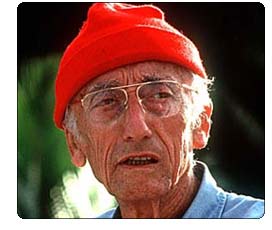Jacques Cousteau’s private advice applied to energy policy
June 11th, marked Jacques-Yves Cousteau’s 100th birthday. “The Undersea World of Jacques Cousteau” television specials were the “must see TV” of the 60’s and 70’s. The “Captain” and his team aboard the Calypso enthralled us. For many generations, he was the exemplification of a conservationist, who was also a genius at communication. While he may be remembered as the premier underwater explorer, he actually evolved to focus on broader concerns for the planet, its inhabitants, and their quality of life.

At age 86 Jacques was deeply concerned about the planet that we were leaving to future generations, with issues ranging from a deteriorating ocean, to fresh water supplies, to climate change. Several conversations focused on the challenge of changing public awareness and policy. Late one night I asked, “How do we change the world?” With a dismissive wave of his hand, in his distinctive French accent, he began:
“Forget the politicians — they all think short term…. But there is something I have found that works. Identify an issue with a campaign that has emotional appeal. Advocate a specific policy. Get letters, petitions, and faxes. With thousands of signatures, the politicians will join the parade — No — they will try to lead the parade.
I did this three times with success. To push for the Antarctic treaty; to end French nuclear testing in the Pacific; and to promote a new legal concept at the U.N., ‘The Rights of Future Generations.’ We must appeal to the public directly with a powerful message and tie it to a specific action or change in policy. I think this is the only way.”
How direct and sensible. Cousteau’s guidance was to build strong public support for a particular policy, in order to create the political backing for it. Contrast that with the current efforts to prevent devastating climate change by mid-century. We find ourselves advocating passage of complex legislation, without even being able to explain what’s in it. Or we advocate a goal such as a 20% reduction in greenhouse gases, but without developing public support for a clear way to achieve it.
It is widely accepted that the key driver of climate change is increased greenhouse gas emissions. Specifically the greatly elevated CO2 level is wreaking havoc with the oceans that Cousteau worked so hard to protect. The effects range from coral bleaching, to ocean acidification, to sea level rise. I believe the most efficient way to reduce carbon emissions is to institute a pricing mechanism. We need a coordinated sustained campaign to develop popular support for one, so that the lobbyists are not the only presence on Capitol Hill.
There are a number of ways that carbon might be priced. Sadly most of the concepts in the proposed legislation is compromised, having been through the Washington DC “sausage factory” trying to protect or favor one group or another — however well-intentioned. What is missing, is public support for a carbon pricing mechanism. Those in Congress reiterate that there is no significant support for any tax, carbon, or otherwise.
The first scientist to sound the alarm bell about climate change was Dr. James Hansen from NASA. He is widely acknowledged to be one of the leading authorities and voices on the issue. Interestingly his leadership is not limited to the science. He has proposed several methods to institute carbon pricing, that will avoid the stigma of a “tax.” His “Fee and Green Check” seems right on target. Disappointingly, the idea has not caught on to date. Which brings us back to our role.
Cousteau’s final advice was to engage the public by means of petitions — now greatly facilitated by the Internet. His experience was that politicians will likely join the parade, once they see grassroots enthusiasm for a new policy. Individuals and organizations can state their clear support for a carbon pricing policy, starting now. The commemoration of his 100th birthday is a good time to apply his insight and wisdom to the climate challenge — the one that will determine the viability of our ocean planet.
For my part, I pledge to look for those petition opportunities. If you hear of any, please let me know on this website. If you would like to be kept informed, please sign up for the e-mail updates.
This Essay is adapted from “Applying Jacques Cousteau’s Wisdom” originally published June 10, 2010 on the highly influential forum, http://thinkprogress.org/climate/issue/, edited by Joe Romm.
